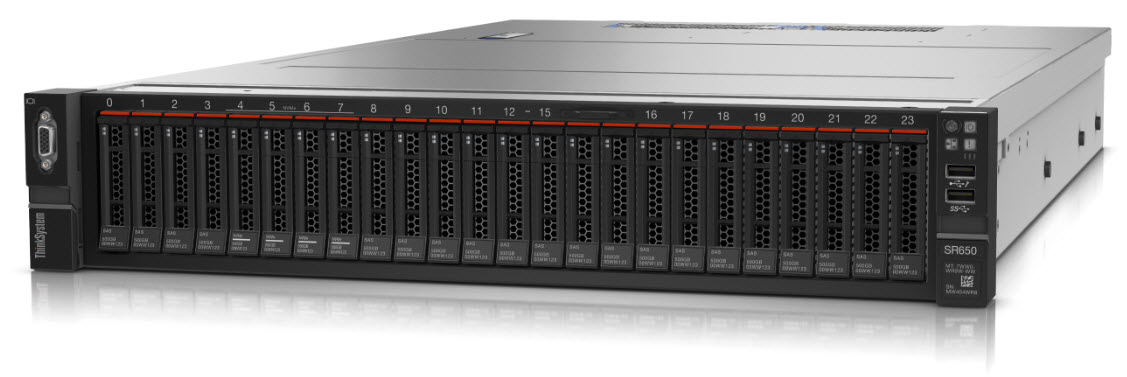Abstract
The Lenovo ThinkSystem SR650 has set a new six-node 2-socket performance world record with the SPECmpiM_base2007 metric from the MPI M2007 suite of the SPEC MPI 2007 Benchmark.
This document summarizes the SPECmpiM benchmark result for the ThinkSystem SR650 that was published on April 2, 2019. The document lists the result, summarizes the major components of the configuration under test, and provides the link to the relevant benchmark organization’s web site for details about the result.
Introduction
The Lenovo ThinkSystem SR650 has set a new 6-node 2-socket performance world record with the SPECmpiM_base2007metric from the MPI M2007 suite of the SPEC MPI 2007 Benchmark. The SPECmpiM Benchmark suite is the industry standard to evaluate MPI-parallel, floating point, compute intensive performance across a wide range of cluster and SMP hardware.
 This new benchmark result, published in a new SPEC Report on April 2, 2019, demonstrate that the ThinkSystem SR650 continues Lenovo’s leadership with outstanding performance for the server industry.
This new benchmark result, published in a new SPEC Report on April 2, 2019, demonstrate that the ThinkSystem SR650 continues Lenovo’s leadership with outstanding performance for the server industry.
The ThinkSystem SR650 has achieved the following score (1):
- SPECmpiM_base2007 = 67.8
This result is the first and best six-node performance result in the industry.
| Hardware vendor |
System | Result (Base) |
Cores | CPUs | Memory |
|---|---|---|---|---|---|
| Lenovo (1) | ThinkSystem SR650 (Intel Xeon Platinum 8280, DDR4-2933 MHz, HT Off, Turbo on) | 67.8 | 336 | 12 | 4608 |
Each SR650 was configured as follows for the benchmark audit:
- Lenovo ThinkSystem SR650
- 2x Intel Xeon Platinum 8280 processors (28 cores, 2.70GHz)
- 768 GB memory (24x 32GB RDIMMs running at 2933MHz)
- 1 TB 12Gbps SAS 2.5" SSD
- Red Hat Enterprise Linux Server release 7.6, Kernel 3.10.0-957.el7.x86_64
Results referenced are current as of April 2, 2019.
(1) The Lenovo benchmark result can be found at:
https://www.spec.org/mpi2007/results/res2019q2/mpi2007-20190312-00615.html
About the ThinkSystem SR650
The Lenovo ThinkSystem SR650 server now supports Intel Optane DC Persistent Memory and up to two second-generation Intel Xeon Scalable processors. It features up to 36% total performance improvement compared to the previous generation and supports two 300W high-performance GPUs and ML2 NIC adapters with shared management. Unique Lenovo AnyBay technology provides the flexibility to mix-and-match SAS/SATA HDDs/SSDs and NVMe SSDs in the same drive bays. Support is now available for up to 24 NVMe drives.
For medium to large enterprises, and managed and cloud service providers, Lenovo ThinkSystem SR650 is the optimum 2U, two-socket server—the most widely used server type worldwide. It’s engineered to deliver high performance with 205W CPUs, low-latency NVMe drives, and high-power GPUs.
With Lenovo’s history of reliability, the highly flexible and configurable SR650 is the ideal platform for hyper-converged infrastructure (HCI) or software-defined storage (SDS). It provides a solid foundation for:
- Transforming physical resources into services, using validated designs for hybrid cloud
- Performing analytics on streaming data, using validated designs for Big Data
- Increasing productivity of virtualized transactional systems, using validated designs for OLTP databases.
Lenovo XClarity Controller is an all-new hardware embedded management engine common in every ThinkSystem server. XClarity Controller features an uncluttered graphical user interface, industry standard Redfish-compliant REST APIs, and enables booting in half the time of prior generation servers, with up to 6x faster firmware updates.
Lenovo XClarity Administrator is a virtualized application that centrally manages ThinkSystem servers, storage, and networking. Via reusable patterns and policies, it ramps up and scales infrastructure provisioning and maintenance. It serves as a central integration point to extend your data center management processes to physical IT. Running XClarity Integrators in external IT applications, or integrating through REST APIs, helps you further speed services provisioning, streamline IT management, and contain costs.
About SPECmpiM
The SPEC MPI 2007 benchmark suite evaluates Message-Passing Interface (MPI)-parallel, floating point, compute-intensive performance across a wide range of cluster and symmetric multiprocessing (SMP) server hardware. This suite continues the SPEC tradition of giving users the most objective and representative benchmark suite for measuring and comparing high-performance computer systems.
SPEC MPI 2007 focuses on performance of compute intensive applications using the MPI, which means this benchmark emphasizes the performance of all of the following:
- Type of processor
- Number of computer processors
- MPI Library
- Communication interconnect
- Memory architecture
- Compiler used
- Type of shared file system
The benchmark is not intended to stress other computer components such as the operating system, graphics, or the I/O system.
For more information about SPEC MPI 2007, see https://www.spec.org/mpi2007/.
Learn more
To learn more about solutions for compute-intensive applications, please contact your Lenovo Sales Representative.
To find out more about SPEC, visit https://www.spec.org
To learn more about the Lenovo ThinkSystem SR650 server, visit the SR650 product web page:
https://www.lenovo.com/us/en/data-center/servers/racks/ThinkSystem-SR650/p/77XX7SRSR65
Related product families
Product families related to this document are the following:
Trademarks
Lenovo and the Lenovo logo are trademarks or registered trademarks of Lenovo in the United States, other countries, or both. A current list of Lenovo trademarks is available on the Web at https://www.lenovo.com/us/en/legal/copytrade/.
The following terms are trademarks of Lenovo in the United States, other countries, or both:
Lenovo®
AnyBay®
ThinkSystem®
XClarity®
The following terms are trademarks of other companies:
Intel, the Intel logo, Intel Optane®, and Xeon are trademarks of Intel Corporation or its subsidiaries.
Linux® is the trademark of Linus Torvalds in the U.S. and other countries.
SPEC® and SPEC MPI® are trademarks of the Standard Performance Evaluation Corporation (SPEC).
Other company, product, or service names may be trademarks or service marks of others.
